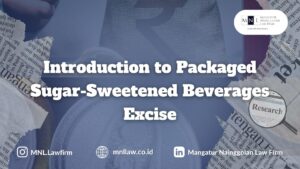
Introduction to Packaged Sugar-Sweetened Beverages Excise
The imposition of excise is identical to that of cigarettes and alcohol. Not only cigarettes and alcohol, excise can also be imposed on packaged sugar-sweetened beverages (MBDK). The aim is to reduce excess sugar consumption, which can have a negative impact on public health such as obesity and diabetes, and increase state revenue.
What is Excise Tax?
Law No. 11 of 1995 concerning Customs and Excise, as amended by Law No. 39 of 2007 concerning Excise (“Excise Law”), defines excise as a state levy imposed on certain goods that have the nature or characteristics specified in this law.
The nature and characteristics of goods subject to excise are as follows:
- Consumption of such goods needs to be controlled,
- Distribution of such goods needs to be monitored,
- Use of such goods may have negative impacts on society or the environment,
- Use of such goods requires the imposition of a state levy for the sake of fairness and balance,
The functions of excise include serving as a source of state revenue, regulating the consumption of certain goods, providing social protection, and controlling production and distribution.
Excise on Cigarettes and Alcohol First
The imposition of Excise on cigarettes and alcohol has been in place since the enactment of the Excise Tax Law in 1995. This imposition is based on the provisions of Article 4 Paragraph 1 of the Excise Law, which states:
(1) Excise tax shall be imposed on excisable goods consisting of:
- ethyl alcohol or ethanol, regardless of the materials used and the manufacturing process;
- beverages containing ethyl alcohol in any concentration, regardless of the materials used and the manufacturing process, including concentrates containing ethyl alcohol;
- tobacco products, including cigarettes, cigars, leaf tobacco, sliced tobacco, and other processed tobacco products, regardless of whether substitute materials or auxiliary materials are used in their manufacture.
Furthermore, Paragraph (2) states that the addition or reduction of types of Excise Goods shall be further regulated by Government Regulation.
MDBK Subject to Excise?
The policy of imposing excise on MDBK is due to the negative effects of consuming MDBK. Based on data from the Basic Health Research (Riskedas), more than 60% of the population consumes packaged sweetened beverages every day, which has contributed to a surge in obesity and diabetes. The number of diabetes patients increased from 10.7 million (2019) to 19.5 million (2021). In 2021, the daily sugar consumption of the Indonesian population reached 160 grams, far exceeding the safe limits set by the WHO and the Indonesian Ministry of Health, with Indonesia ranking fifth in terms of the highest number of diabetes patients. The threat of diabetes is not only targeting adults but also children. According to data from the Indonesian Pediatricians Association (IDAI) as of January 31, 2023, the number of diabetes cases in children has surged by 70 times, with approximately 60% of patients being girls.
The government, through Presidential Decree of the Republic of Indonesia Number 4 of 2025 on the Program for the Formulation of Government Regulations for the Year 2025, has included a draft government regulation on taxable goods in the form of sweetened beverages in packaging. The content of the government regulation includes:
- Scope of packaged sweetened beverages subject to excise;
- When excise is payable and who is responsible for paying it;
- Excise rates and when excise is payable;
- Exemptions and waivers from excise;
- Allocation of revenue from excise on packaged sweetened beverages;
- Excise refunds; and
- Licensing & prohibitions.
The logical consequence of the enactment and implementation of the draft Government Regulation is an increase in the price of MDBK.
Legal Basis
Law No. 11 of 1995 concerning Customs and Excise
Law No. 39 of 2007 concerning Amendments to Law No. 11 of 1995 concerning Customs and Excise
Law No. 7 of 2021 concerning Harmonization of Tax Regulations
Decree of the President of the Republic of Indonesia No. 4 of 2025 on the Program for the Preparation of Government Regulations in 2025 on the Program for the Preparation of Government Regulations in 2025
Authors:
Yohana Marathana, S.H.
Eva Rutnauli Sinaga
Editor:
Muhammad Arief Ramadhan, S.H.
